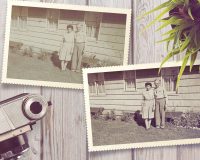Years ago, at a presentation by James Walsh, a history professor at the University of Colorado at Denver, he shared a powerful African proverb.
The proverb recognizes two spirits. “Sasha are spirits known by someone still alive, while Zamani are spirits not known by someone currently alive.” According to James Loewen in his book Lies My Teacher Told Me: “The recently departed whose time overlapped with people still here are the Sasha, the living dead. They are not wholly dead, for they live on in the memories of the living … when the last person knowing an ancestor dies, that ancestor leaves the Sasha for the Zamani, the dead.”
Walsh’s use of the proverb was in illustrating the power of oral and personal history. As a Personal Historian, I spend a lot of time educating people on the power and value of leaving your story for future generations. As long as people are alive and can pass your stories on to future generations, you will retain some degree of immortality. But like the game Telephone, each iteration of the story becomes less and less reliable and more anecdotal until what is left after a few generations is, if you are lucky, merely a name on a genealogical chart and some mention of characteristics.
Walsh’s intention was to enforce that value with a visual metaphor that shows that when the stories come to the end of the line, you are truly dead to the world.
The African proverb itself is more about the collective unconscious (as Carl Jung would later refer to it.) This is a reservoir of experience that we all belong to that has us share certain knowledge such as archetypes, in a collective and universal fashion. According to Wikipedia, Zamani “is the final storehouse for all phenomena and events, the ocean of time in which everything becomes absorbed into a reality t hat is neither after nor before.”
In the African culture, it’s not unusual for people to be able to name all of their great-grandparents and great-great-grandparents. There is a clearly defined culture of storytelling and keeping memories alive that is devolving as our culture moves away from the nuclear family in search of jobs and opportunity. Oral and Personal Historians are trying to bring back that culture of storytelling and show the value in keeping your memory alive for future generations.









Thank you for explaining the African lore. It is nice to think that the woman I blogged about today is “sasha” because I remember her.
wonderful point, Stefani. So many people considering telling their think in terms of their living relatives only and think, “oh, they’re not interested in my story” or “they already know all about me.” But when we begin to think about the generations yet unborn, then I think the question becomes, what do I want people to know about what it was like to live my life, in this time, in this place.
Thanks for the reminder.
Just came across this, Stefani. It is wonderful and I’ve passed it along to several people here. great to meet you last November in Victoria and looking forward to seeing you in Las Vegas.
Thanks Francie, it was great to meet you as well. Thanks for reviewing my blog!